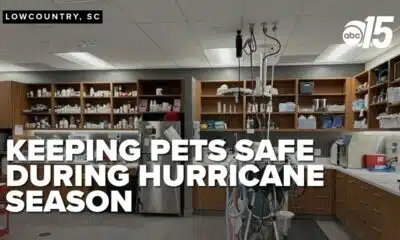News from the South - Tennessee News Feed
Stockard on the Stump: Williamson Republican vote could foreshadow 2026 state Senate race
Stockard on the Stump: Williamson Republican vote could foreshadow 2026 state Senate race
by Sam Stockard, Tennessee Lookout
March 7, 2025
In a potential preview of Williamson County’s 2026 state Senate race, “Elevate 2025” candidates eased past “Williamson County Conservatives” this week in a battle to run the Republican Party from the right.
Though they weren’t on the ballot, the contest pitted Gary Humble of Tennessee Stands against Senate Majority Leader Jack Johnson, whose candidate, Brian Clifford, fell short of the Humble group’s Steve Hickey for the party chairmanship despite heavy spending.
Williamson County residents Gov. Bill Lee and his wife were among those sitting next to Johnson, who has spent the last two years burnishing his conservative bona fides after a close contest with Humble.
The atmosphere at the Franklin Marriott Cool Springs, an appropriate setting for wealth, was described as tense as Hickey captured 796 votes to Clifford’s 751. The rest of the candidate slate proved to be a replay of 2023, setting up a possible race of Johnson vs. Humble as the Senate leader seeks re-election and the post of Senate speaker, which would make him lieutenant governor and one of the state’s most powerful politicians.
Stockard on the Stump: Humble backer files election complaint against Leader Johnson
Humble, who was ill and couldn’t attend the event, said he was “blown away” by the turnout which brought more than 1,500 votes for the chairmanship.
Opponents cast his group as backers of a Republican Party caucus, instead of a primary, something they apparently broached but that he denied. Humble said they’re more interested in closing Republican primaries statewide to keep Democrats from watering down outcomes. A bill by Republican Rep. Chris Todd of Jackson would do the trick.
The win for “Elevate 2025” marks a continuation from the last two years and sounds hauntingly similar to Project 2025, the national movement to reshape the federal government and give the president more power.
Humble wouldn’t say whether the group’s win gives him a victory over Johnson, though he acknowledged some people might categorize it that way. “That’s not what we were trying to accomplish here,” he said.
Johnson, though, spearheaded the Williamson County Conservatives PAC and asked the first few donors to give money in an effort to remove the Williamson County Republican Party board, according to Humble.
“It’s sad that Jack stole all those people’s money and pissed it down the drain,” Humble said.
Nashville businessman Baxter Lee gave $5,000 to the group in December 2024, and former congressional candidate Kurt Winstead kicked in $1,000 in January. The rest of the financials haven’t been filed.
State Rep. Todd Warner, a Chapel Hill Republican whose district includes part of Williamson, said it was clear Johnson was backing the Williamson County Conservatives.
“It was very interesting to see the governor and the first lady there … in Williamson County,” Warner said.
Republican Rep. Jake McCalmon of Franklin called the outcome “tremendous” but said he would never support caucuses to select party candidates. He said he tried to stay out of the chairman race.
Johnson acknowledged he voted for Clifford, director of outdoor recreation for the Tennessee Department of Economic and Community Development, because he has “grave concerns” about moving to a caucus selection for local races. (Oddly enough, an effort to require primaries in local elections fell flat last year.)
“I’m just happy we set a new record for a county party convention. It was a huge turnout, and it was great,” Johnson said.
The Senate leader scoffed at the notion he’s concerned that the outcome could be seen as a victory for Humble over him, though he is starting to run for another four years already. Humble isn’t willing to commit to a state Senate campaign just yet.
But you can feel a collision coming, one way or another.
Crowded house
Opponents of the bill allowing Tennessee school districts to turn away immigrant students without legal documentation packed the hallway outside the Senate’s main meeting room Wednesday after the Education Committee approved the bill 5-4. Three Republicans voted against the bill.
It was the biggest and loudest crowd in memory at the Cordell Hull Building as tiny children with parents and screaming teens vented their frustration with lawmakers.
Amid the claustrophobia, a moment of clarity arose: Tennessee is preparing to block immigrant children from going to K-12 public schools (because of the expense?) but pay for kids to go to private schools, including those already enrolled.
Is this a conundrum? Or is it a hypocritical hypothetical? Maybe it’s both.
Either way, this was far from one of Tennessee’s shining moments.
Republican Sen. Ferrell Haile of Gallatin was among the four who voted against the measure. He said Thursday he didn’t believe the state should punish children for the mistakes of their parents or the government’s poor immigration policies.
The bill by Sen. Bo Watson, a Hixson Republican who chairs the finance committee, and House Majority Leader William Lamberth of Portland, puts the onus on school districts to determine whether they’ll require kids to show documentation before allowing them into classrooms.
They make no bones about wanting a legal case that will go to the U.S. Supreme Court and overturn Plyler v. Doe, the 1982 decision requiring public schools to take all children regardless of immigration status.
So gear up for another legal battle.
On the semi-bright side, now that Attorney General Jonathan Skrmetti doesn’t have to spend resources fighting President Joe Biden’s policies, he can turn that team of attorneys toward defending President Donald Trump’s Tennessee policies.
It could be a wash.
Just above “rock bottom”
The House Public Service Subcommittee this week killed Rep. Bob Freeman’s bill that would have required lobbyists to identify each bill and legislature measure they’re being paid to oppose or support.
Freeman, a Nashville Democrat, said afterward it’s “disappointing” that lobbyists and special interest groups have more power than the public or lawmakers.
“In Tennessee, I believe we have an uneven advantage for lobbyists,” Freeman said. That’s mainly because lawmakers have little, if any, staff to research bills.
Lawmakers rely on lobbyists to provide them with information, but sometimes they take advantage of that and hide the bill’s benefactor, he said.
“I think the people of Tennessee should know who is paying people to fight for bills and to propose bills and fight to have them passed,” Freeman said.
Lobbyists are required to disclose whom they’re working for but not where they stand on those matters. Freeman rejects the notion that disclosing that type of information would be too difficult.
I think the people of Tennessee should know who is paying people to fight for bills and to propose bills and fight to have them passed.
– Rep. Bob Freeman, D-Nashville
Lobbyist Mark Greene, who represents lobbyists, said afterward the bill would increase workloads dramatically. Other lobbyists said they would have to disclose the legislature’s entire slate of bills because they move from one to another.
“We think it represents quite a bit more paperwork, quite a bit more exposure in terms of the potential for making an error,” said Greene, who shouldn’t be confused with U.S. Rep. Mark Green. “We’re going faster and faster every year, and we think providing this is of marginal utility.”
The only question for Freeman in committee came from Rep. Warner, who asked whether government-paid lobbyists would be included in the bill, meaning those who work for the governor and state departments. The committee’s attorney told him those people don’t qualify as lobbyists.
Regardless, this matter reminds me of something former Rep. Bob Ramsey used to say when referring to the lobbyist for lobbyists. “That makes you the mayor of rock bottom.” He probably softened the blow by handing out candy.
On the outs?
A group of 12 Democratic lawmakers who walked out of the governor’s State of the State address in February say they’re being blocked from passing any bills this session.
With only 24 members in the House, Democrats usually don’t pass many bills anyway. But this year, things appear to be worse.
Democratic Rep. Yusuf Hakeem of Chattanooga said it became clear to him this week when Republican lawmakers killed his bill that would have had security workers statewide wear matching patches to let people know they’re security, not law enforcement. He said it was backed by the Peace Officer Standards & Training Commission, in addition to Hamilton County law enforcement.
Hakeem said afterward he has the feeling it would be “extremely difficult for those of us who walked out to get a bill through. It’s very unfortunate.”
Democratic Rep. Sam McKenzie of Knoxville said he’s getting the same idea about repercussions against boycotters. He walked out of the State of the State in protest of Lee’s private-school voucher bill that passed in a February special session.
“We’re all here representing 70,000 people, and what I would say to (Republican leadership) is members of their party do things I find very inflammatory, very disrespectful,” McKenzie said.
Asked about the matter Thursday, House Republican Caucus Chairman Jeremy Faison said he wasn’t aware of any concerted effort to block those members’ bills, but he added if they were going to act like “knuckleheads,” then they deserve it.
“I got a Nikon camera / I love to take a photograph / So mama don’t take my Kodachome away.” *
*”Kodachrome,” Paul Simon
GET THE MORNING HEADLINES.
Tennessee Lookout is part of States Newsroom, a nonprofit news network supported by grants and a coalition of donors as a 501c(3) public charity. Tennessee Lookout maintains editorial independence. Contact Editor Holly McCall for questions: info@tennesseelookout.com.
The post Stockard on the Stump: Williamson Republican vote could foreshadow 2026 state Senate race appeared first on tennesseelookout.com
News from the South - Tennessee News Feed
"The chances of finding him were very slim": Lost man, dog found in nick of time in West TN
SUMMARY: Troy Roper, 63, was rescued after nearly two days lost in a snake-infested swamp in Haywood County, Tennessee, while searching for his missing dog, Baxter. Roper, who has diabetes, was found weak and dehydrated, needing urgent medical care after becoming disoriented close to home. Emergency crews from multiple agencies conducted extensive air and ground searches, eventually locating him chest-deep in water with his dog nearby. His rescue involved specialized equipment to navigate the marshland. Both Roper and Baxter were covered in mud but unharmed. Roper was hospitalized, treated for low blood sugar and other issues, then released safely.
The post "The chances of finding him were very slim": Lost man, dog found in nick of time in West TN appeared first on www.wkrn.com
News from the South - Tennessee News Feed
New national school voucher program included in ‘big, beautiful’ law, with no cap on cost
by Shauneen Miranda, Tennessee Lookout
July 12, 2025
WASHINGTON — A national private school voucher program is now law, though the school choice initiative comes with a huge caveat. States also choose — whether or not to participate.
It’s a setback for advocates who hoped to see the program — baked into the mega tax and spending cut bill President Donald Trump signed into law on July Fourth — mandated in all 50 states.
The permanent program, which starts in 2027, saw several versions between the House and Senate before getting to Trump’s desk as part of congressional Republicans’ massive reconciliation package.
Robert Enlow, president and CEO of EdChoice, touted aspects of the program, but said his organization would have preferred to see a 50-state program, rather than allowing states to opt in or decline.
“I think I’m really worried about that because this is seen as a sort of more partisan issue and as a result, what would make a governor in a blue state say, ‘Let me bring in school choice’?” said Enlow, whose nonprofit focuses on advancing school choice options.
Still, Enlow described the program as “just another step along the way of giving parents more choices.”
Who will join?
It remains to be seen which states will participate, including those with their own voucher programs already underway.
Jon Valant, a senior fellow at the nonpartisan Brookings Institution, said he’s “not clear on how states will shake out on the question of whether or not to participate.”
“I’m sure the vast majority of, really, all red states will participate in this thing, but I don’t know what’s going to happen in blue and purple states,” said Valant, who also serves as director of the think tank’s Brown Center on Education Policy.
Despite that unknown, Valant said that states “do have some incentive to participate because if they don’t, then they’re potentially losing access to some funds that they wouldn’t otherwise get.”
How the program works
The program allocates up to $1,700 in federal tax credits for individuals who donate to organizations that provide private and religious school scholarships.
There is also no cap to the cost of the program, unlike earlier versions seen in both chambers of Congress.
The scholarship funds would be available to families whose household incomes do not exceed 300 percent of their area’s median gross income.
More than 138 million people could be eligible to make use of the tax credit in 2027, according to an analysis from the Institute on Taxation and Economic Policy.
However, Carl Davis, research director of the left-leaning think tank, notes in the analysis that “most of those people will not contribute” given the necessary paperwork and vouchers’ unpopularity with the public.
A state’s program participation will be decided by its governor or “by such other individual, agency, or entity as is designated under State law to make such elections on behalf of the State with respect to Federal tax benefits,” according to the final bill text.
The GOP’s school choice push
The umbrella term “school choice” centers on alternative programs to one’s assigned public school.
The effort has sparked controversy, as opponents say these programs drain critical funds and resources from school districts, while school choice advocates describe the initiatives as necessary for parents dissatisfied with their local public schools.
Trump and congressional Republicans have made school choice a major part of their education agenda.
The program also reflects a sweeping bill that GOP Reps. Adrian Smith of Nebraska and Burgess Owens of Utah and Sen. Bill Cassidy of Louisiana reintroduced in their respective chambers earlier this year.
‘Very little quality control’
Valant, of the Brookings Institution, expressed several concerns about the program, saying “there’s very little quality control, transparency or accountability for outcomes in this program, and it’s potentially a major use of public taxpayer funds.”
He said he doesn’t see anything in the program’s text that “protects against widespread waste, fraud and abuse and from programs and schools that aren’t providing much value at all to students from continuing to get a large amount of funding.”
The program also came as Trump and his administration continue to dramatically redefine the federal role in education.
Trump’s fiscal 2026 budget request calls for $12 billion in spending cuts to the Education Department. A summary from the department said this cut “reflects an agency that is responsibly winding down.”
Billions on hold
The administration has also taken heat for its recent decision to put on hold $6.8 billion in federal funds for K-12 schools.
Sasha Pudelski, director of advocacy at AASA, The School Superintendents Association, said that a time when the administration is withholding billions of dollars in these funds for public schools, “the idea that we’re going to spend an unlimited amount of tax dollars to support private and religious schools is unthinkable, unimaginable — it’s horrific.”
“This is yet another handout to wealthy Americans who can already afford to send their children to private religious schools and at a cost that comes from tax dollars being deferred away from public education that serve the poorest and neediest students in America,” added Pudelski, whose organization helps to ensure every child has access to a high quality public education.
Tennessee Lookout is part of States Newsroom, a nonprofit news network supported by grants and a coalition of donors as a 501c(3) public charity. Tennessee Lookout maintains editorial independence. Contact Editor Holly McCall for questions: info@tennesseelookout.com.
The post New national school voucher program included in ‘big, beautiful’ law, with no cap on cost appeared first on tennesseelookout.com
Note: The following A.I. based commentary is not part of the original article, reproduced above, but is offered in the hopes that it will promote greater media literacy and critical thinking, by making any potential bias more visible to the reader –Staff Editor.
Political Bias Rating: Center-Right
This content primarily presents the national school voucher program, a policy generally supported by conservative and Republican leaders, positively but with acknowledgment of criticisms from left-leaning sources. It highlights the GOP’s emphasis on school choice and includes comments from advocates aligned with conservative education reform while also giving voice to critiques about public school funding and potential risks raised by left-leaning think tanks and education associations. The coverage strives for balance but leans center-right by framing the initiative as a step forward in parental choice, aligning with mainstream conservative education priorities.
News from the South - Tennessee News Feed
Tennessee Department of Treasury working to connect residents with missing money
SUMMARY: The State of Tennessee is distributing $193 million in unclaimed property, which includes money businesses couldn’t return to rightful owners, such as rent or utility deposits, overpaid medical bills, or unpaid wages. One notable case involved a widow receiving over a million dollars from dormant stock. Residents can check for unclaimed money easily by visiting claimittn.gov and typing their name. On July 19, Tennessee Treasury officials will assist people in Rutherford County—where $24 million is unclaimed—at the Berry Festival in Murfreesboro from 10 a.m. to 3 p.m. Claims can take as little as two weeks, with yearly portal updates on November 1.
The post Tennessee Department of Treasury working to connect residents with missing money appeared first on www.wkrn.com
-
The Center Square6 days ago
Here are the violent criminals Judge Murphy tried to block from deportation | Massachusetts
-
News from the South - Kentucky News Feed6 days ago
Woman arrested in Morgantown McDonald’s parking lot
-
News from the South - Kentucky News Feed6 days ago
Cruising into Louisville: Viking cruise ship docks downtown on Ohio River
-
News from the South - Oklahoma News Feed6 days ago
Cell, no! After Two Years of Debate, Schools Get Months to Ban Phones
-
News from the South - Arkansas News Feed6 days ago
Arkansas and Oklahoma teams deploy to aid Texas floods
-
News from the South - North Carolina News Feed5 days ago
Learning loss after Helene in Western NC school districts
-
News from the South - Florida News Feed6 days ago
Texas flooding: Search for survivors continues
-
News from the South - South Carolina News Feed7 days ago
Keep your pets safe during hurricane season: experts share advice on go-bags and safe spaces













































